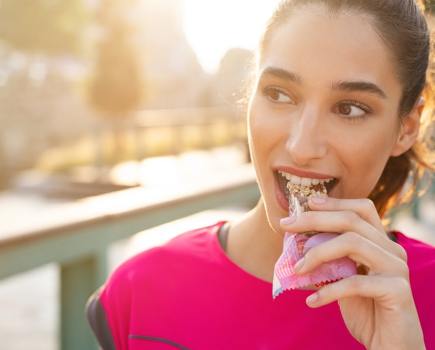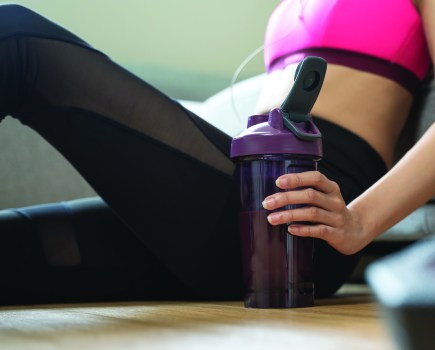Nutrition plays a vital role in improving your fitness, so ensure you’re eating the right foods to complement your exercise routine. Here are some of the best foods to give you energy for your workout and ensure you get the most from your exercise routine.
Carbohydrates (glucose) are the quickest and easiest form of energy for your body. They are either broken down into glycogen (for instant energy) or glucagon (stored energy). Glycogen can only be stored for 24 hours so it is important that you load your body with complex/‘good’ carbs (like brown rice and wholegrains) at every meal, and in particular before endurance events like a long run or cycle. Try not to load your body with refined sugar (e.g. white rice and pasta), as your body has no need for sugar when it’s pushed to the limit. It will also burn off too quickly and leave you feeling more tired.
If you are going for a high-intensity gym session, make sure you have eaten an energy-filled snack (30-60 minutes) or meal (at least two hours) before your workout. This could be a low-GI option like wholegrain cereal with milk or, for a faster-releasing option, try three fig rolls or have a sports drink as they are specially formulated to provide the right balance.
Fat is also a necessary fuel, as it is the most energy-dense nutrient and provides many of the body’s tissues and organs, including the heart, with most of their energy. Good examples include oily fish, olive oil, nuts, seeds and some meat and dairy.
The importance of water during exercise
During your workout it is important to stay hydrated – not just to replace the loss through sweating, but also to maintain a healthy balance of electrolytes so that your body performs at its optimum. Good hydration reduces the risk of muscle damage, supports the immune system, aids recovery and ensures you get the most from your workout.
Foods for exercise recovery
It is just as important to refuel after a workout, as your glycogen stores are depleted, and workouts can actually break down your muscle tissue. So, after exercise, you need to rebuild your fuel stores and provide your body with the right nutrients to repair damaged muscle fibres. Eat the wrong foods and you’ll feel sluggish and tired for the rest of the day. Eat the right foods and you’ll have more energy, feel stronger and recover faster.
When it comes to post-workout refuelling there is some debate about whether you should eat immediately after exercise, but this is more from a weight-management perspective. From a training perspective you should make use of what is known as ‘the golden hour’ after exercise and get some carbs back into your body as soon as possible. The quicker you can get carbohydrates, protein and fluid into your body after your workout, the quicker your body will recover from the stresses and strains you’ve put it through.
The golden hour is the time when the muscles absorb the most nutrients and when the enzymes responsible for making them are most active, which leaves you just a few hours to reload your muscle glycogen. In fact, carbohydrate is converted into glycogen some one-and-a-half times faster than normal straight after exercise. If you work out daily, speedy recovery is crucial, so have a carbohydrate-rich drink or snack as soon as possible after your workout, ideally within 30 minutes. Bananas, cereal bars, rice cakes or brown bread are perfect foods to eat following a workout.
Protein for exercise recovery
Protein is also important for recovery, particularly when it comes to weight-training, as it helps muscles to repair and grow. Milk has been shown to be effective after a workout, as well as lean white meats, fish, soya, beans and pulses. Whatever you decide to eat post-workout, these foods will provide you with sufficient levels of protein to help your muscles after a weight-bearing session.
Getting your nutritional balance right is essential for improving your stamina, speed, performance and recovery, so don’t underestimate its importance.
• Vitamin C is a powerful antioxidant and is required for tissue repair and helps boost the immune system.
• Potassium is needed for nerve and muscle function.
• Calcium is good for bone health and muscle function.
• B vitamins are important as they are required for the conversion of food into energy. B3, B6 and B12 are especially important in the storage of glycogen.
• Magnesium is essential for energy production. It is easily lost through sweating and low levels can lead to muscle fatigue.
• Omega-3 is especially important for runners. It’s anti-inflammatory and therefore aids muscle repair between workouts.







